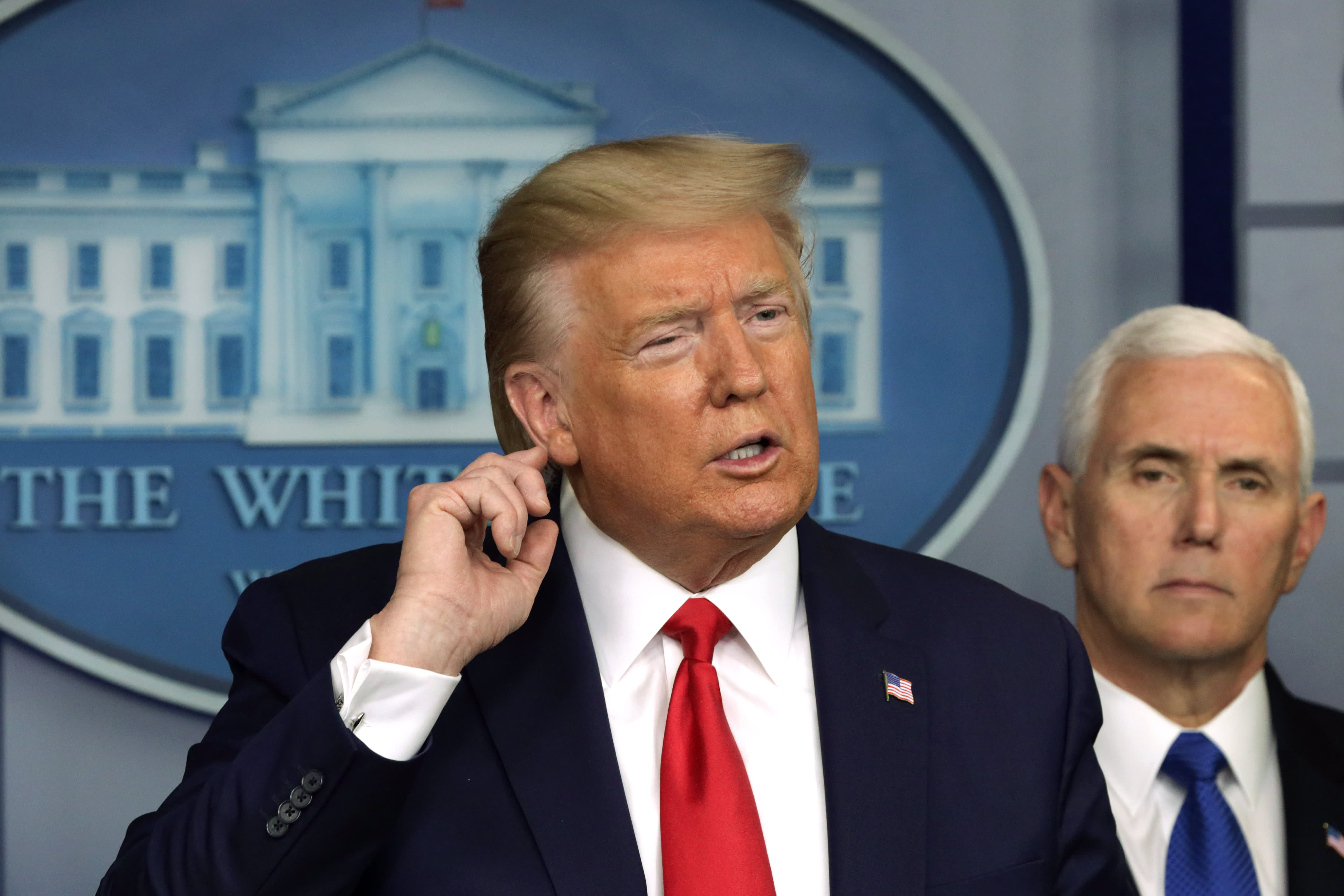U.S. President Donald Trump speaks as Vice President Mike Pence looks on during a news briefing on the latest development of the coronavirus outbreak in the U.S. at the James Brady Press Briefing Room at the White House March 18, 2020 in Washington, DC.
Alex Wong | Getty Images
The COVID-19 pandemic is a matter of life and death. Keep your focus on helping Americans stay healthy. History will measure your presidency by how many deaths were prevented, not on what the Dow Jones average was in March of 2020.
Yes, you must address the economic ramifications of this crisis. But stop looking at the stock market score board and start focusing on fixing what’s going wrong with the underlying economy.
The 2.3 percent GDP growth for 2019 was the slowest in three years. Even prior to COVID-19, we were not experiencing, as you suggested, the “greatest economy in the history of our country.”
Now the economy is being stressed by a major contraction in virtually all industries, especially the service industry that makes up over 77 percent of the total economy.
There is time to have the essential discussions on what does or does not need to be done for large, billion-dollar industries like the cruise lines, hotels, airlines, and casinos. But how does an immediate focus on multi-national corporations really help the small business owner who may never reopen his or her business, or the employee who was just laid off?
Right now the absolute priority must be helping families who are hit the hardest by their new inability to earn a living. Those who are most economically vulnerable in this situation are tipped workers like waitstaff, arena workers, and hotel staff; “gig economy” workers like rideshare drivers; people who help support working families like daycare workers and housekeepers; and small businesses, like dry cleaners, salons, and restaurants.
Now is the time to act quickly, but also the time to act wisely.
Right now the absolute priority must be helping families who are hit the hardest by their new inability to earn a living.
A payroll tax elimination may make it seem like you are doing something, but what does it do for the unemployed or underemployed? And how is it fair, or even make sense, for wealthy Americans to receive the same level of economic support as someone who is simply struggling to get by?
We already have a system to support unemployed workers, use it. Every American who has lost a paycheck or whose hours have been reduced should immediately be given unemployment at three times the amount typically provided, they and their families should be given a Medicaid card so they can secure health care, and an ETB (food stamp) card to receive food security.
No paperwork delays – cut the red tape. Application made, application accepted. And they shouldn’t have to worry about Congress failing to pass an extension that pulls the rug out from under them before a downturn ends. That assistance must remain until the health crisis is over.
If you are a coronavirus-affected “gig economy” worker, you get the same benefits as an employee. So, the Uber driver can get the same benefits as a regular employee. In the same vein, those employers who want to keep unemployment premiums down by putting workers on zero hours, knock it off. It should never be allowed and certainly not allowed now. Put employees who are not working on unemployment.
The federal government should renew the Emergency Unemployment Compensation program so these new benefits don’t cost states a dime. The federal government must make an immediate deposit into every state unemployment fund to keep those funds solvent. And this crisis should not be used to increase unemployment premiums for affected businesses. The tax rate should be frozen.
To get money into the hands of low-income working Americans, we should double up on the earned income tax credit. For taxpayers who have already filed their 2019 return, cut another check.
For our retirees who are living on fixed incomes from social security, small pensions, small dividends, and interest, the federal government should add $500 in additional monthly social security payments.
On small business relief, low interest loans and tax relief are meaningless. These businesses do not have taxable income or a tax liability and chances are they are already highly leveraged, and they cannot afford to repay business loans even if it is at no interest. Small businesses need cash now. So use the SBA infrastructure, provide immediate grants, not loans, to small businesses. Give them grants for lost inventory and income.
Finally, provide massive relief to the non-profit world that is dealing with the social stress of this crisis. More money for homeless shelters, more money for youth programs, more cash for food programs.
Once these things are done you can turn your attention to what, if any, relief should go to the multi-national corporations who got their tax cuts and spent them on stock buy backs.
Heidi Heitkamp, a CNBC contributor, represented North Dakota for six years in the U.S. Senate. During her tenure on the Senate Committee on Banking, Housing, and Urban Affairs, she pushed to reform the nation’s housing finance system, make housing more affordable, and provide relief to small financial institutions.
